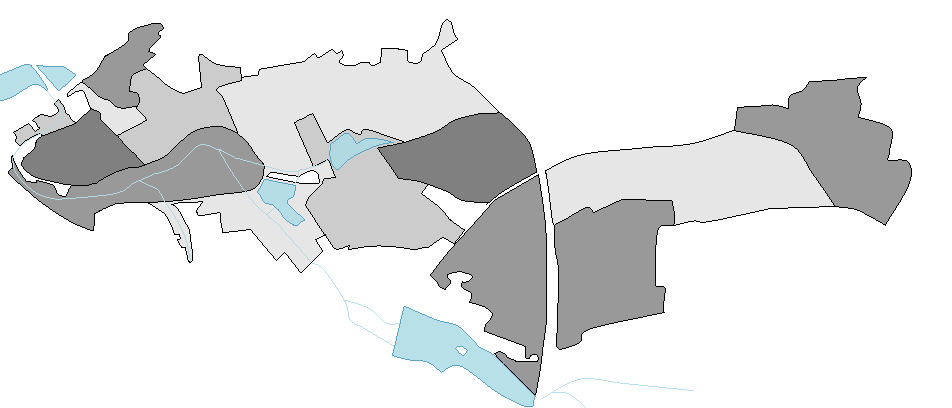Noble Republic of Lurk
50°05′45″N 14°33′15″E / 50.0957782°N 14.5541391°E
This article refers to a micronation or element of micronationalism which is defunct and no longer exists. You can help make the article reflect that or ask on the talk page for further information. |
- See also: Mekniy-Lurk and Mercia
Noble Republic of Lurk Vznešená republika lurkská Second Lurkish Republic ψΔᛘ Σέσ (Loringian) | |||||||||
|---|---|---|---|---|---|---|---|---|---|
| Motto: Aurora Nova, Nova Victoria. | |||||||||
| Anthem: National Anthem of the Noble Republic of Lurk Aurora Nova, Nova Victoria | |||||||||
 Exclaves not included | |||||||||
| Capital | |||||||||
| Largest city | Redwood City | ||||||||
| Official languages | Czech, Loringian, English | ||||||||
| Demonym(s) | Lurkish, Lurkian, Lurkien, Lurk | ||||||||
| Government | Vznešená Republika (Noble Republic) Direct-Representative democracy | ||||||||
• President | Alex White | ||||||||
| Establishment | 25 June 2011 | ||||||||
| Population | |||||||||
• Census | 23 | ||||||||
| Currency | Corona | ||||||||
| Time zone | +1 | ||||||||
| |||||||||
The Noble Republic of Lurk, or Republic of Lurk[1] was a nation in Central Europe and North Antarctica, bordering the Czech Republic, Mercia, Lostisland and Pavlov. Lurk's mainland was located in the Lurk hills area, which was a large claim on local fields, hills and wetlands, which are uninhabited. Lurk's main population, political and industrial centres were the capital Redwood City and the Principality of Ravensburg, which were exclaves from the Lurk Hills. Lurk was also present in Antarctica, where it claimed the Palmer Land, approved by the Antarctic Micronational Union.
The Noble Republic of Lurk was a form of representative-direct confederal and asymmetric-federal democracy, with the bicameral National Assembly, where the Parliament was composed of the Chamber of Deputies, elected directly by the people of Lurk, and the Council of Cantons was composed of Cantonal leaders. Before disestablishment, the Chamber of Deputies was dissolved, with the Council of Cantons being granted the rights of the Chamber of Deputies. Another aspect of the Lurkish democracy was the National referendum, where people had the power to create a referendum for a new law or against previous law passed by the National Assembly, or the people. The state is divided into cantons, all of which were de iure sovereign states, and each canton had different levels of inclusion with the central government (asymmetric federation).
As of September 2017, the Noble Republic of Lurk was under a transitional council, with the task of passing the new constitution and a set of basic laws along with it. On 11 November, the Noble Republic of Lurk joined Mercia.
Lurk is a member of the Antarctic Micronational Union, UMCE and an observer was a co-founding state of the Danubian Multinational Cooperative. Lurk was formerly, directly or indirectly, a member of the OAM, IMTO, GUM and the Confederate States of Prosperity.
Name

Lurk, as is all its previous incarnations, is located in the Lurk hills area from which the nation takes its name. The Lurk hills were considered to be a perfect claim for a new nation, since they had infrastructure (mud and some paved roads), construction resources such as wood, a river to supply water and power, and are relatively quiet area in beautiful nature with no permanent citizens. This are was claimed to not be developed, due to their protected status in both Lurk and the Czech republic, which currently is not either observed or the area is reduced, as new Czech construction projects appear in the north-east of Lurk.

The translation "Lurk" was determined by the approximation of the Czech name for the hills. There was no research into the origin of the name.
Pronounciation
The Lurk component of the name is always pronounced the same as it would be pronounced in Czech (Lurk [IPA: lʊrk]). Pronouncing it in the English way is acceptable in certain contexts, however not official even in the English-speaking cantons.
Capital letters in the Czech variant
Both Vznešená republika lurkská and Vznešená republika Lurkská are considered as official variants, despite the latter being grammatically incorrect in the Czech language. Vznešená republika Lurk is not official, but widely used outside of Lurk.
History
Redwood City can trace its micronational history back to year 2005, when it was part of an informally-established one day nation by the family of Alex White. The nation was a family project, with several family members being assigned various ministries (which were far too numerous for such a small nation), based on the potential merit of the family members. Local currency was designed, drawn and signed by the Finance minister, to be stored in a vault later, their current location is unknown. Tourist waymarks were created through some unique areas on the property. The areas were named in the process, some were assigned national park status. One of the neighbours also declared a micronation. Currently, this micronation is occasionally referenced in the Alex White's family.
In the year 2008, Alex White, the founder of Lurk, participated in his friend's geofictional world, where he owned a nation which he called Yugoslavia, a democratic republic with the capital city situated in Split, Croatia. Along with that, he "owned" Eastern half of Europe and his friend the western. His friends' renaming of local (and distant) geographical features, own language (similar to Czech) were the pillars of early Lurkish culture and are still part of it today. For example, the Nek River's name comes from early Aerian (borrowed from a Dutch word, to honour the first Lurkish president, who was Dutch), and is different from the common Czech name used for it, Rokytka.
Lurk
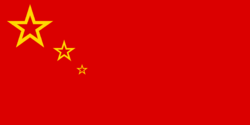
Lurk, as itself, was established on 25 June 2011 under the name LurkSAR, as a socialist state located in what is now known as the Lurk Hills area, claiming no populated land. The nation arrived at first on the YouTube community of micronations. The very first diplomatic act was an attempt to contact New Jonesland, which was at the moment at the centre of community-wide dispute. The diplomatic enquiry was not answered to this day. Second day after its foundation, Lurk established contact with Flatland and started informal relations, and formal relations several months afterwards. Through Flatland, Lurk arrived on MicroWiki in the Summer of 2011. The day of the first diplomatic relationship is now celebrated as the Diplomacy Day, a national holiday in Lurk. A day later, LurkSAR was reformed into Lurk Republic. Lurk Republic participated mostly in the YouTube Community's many disputes, however it stayed as a neutral observer and tried to mediate the conflicts. Its open foreign policy started here as well, as the nation offered diplomacy for all the new nations and tried to offer advice. It was described as one of the few "sensible" nations of the YouTube community[2] by previous members of the community, as it did not create or participate in any of the numerous disputes and so-called wars.
Early Culture
Lurk was, at foundation, influenced mainly by Russian and English culture. The use of English language peaked at this time, as most areas, paths and laws were only presented in English, which led to rather complicated translations afterwards. The Lurkish capital of Redwood was named at this time, and even today has no official Czech name. Lurkish anthem shared the tune with God Save the Tsar, although its name was Aurora Nova, Nova Victoria, which is also the state motto of Lurk to this very day.
Lurk Federation
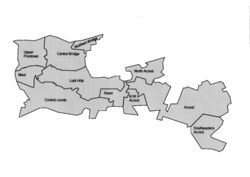
After the collapse of the YouTube community, Lurk reformed into the Lurk Federation, a federation of Lurk and the newly annexed Acrest, which was very close to Lurk and is very similar to it. The area claimed nearly doubled and was at its peak when Lurk claimed surrounding areas, including very populous neighbouring parts of Prague. In January 2012, Lurk has adopted a new flag, and changed its culture to appear more Germanic. Along with this, a new constitution (and the first Lurkish constitution, and the shortest) was adopted. President's office was disestablished and all its powers were transferred to the Prime Minister, due to the President leaving office by his own choice. However, after this move, the nation fell into deep inactivity, leading Lurk into a long period of unions and instability. Several times during this period, Lurk was considering disestablishing itself and creating an indepdented City State of Redwood, or returning all areas back to the Czech republic.
Lurk did not experience almost any growth, political, economic or cultural, with the only exception of diplomatic, which is the reason why many people today still refer to Lurk as a federation.
Diplomacy
Although Lurk was inactive internally, many new diplomatic relationships were created, which remain to this day. The only remaining diplomatic friendship from this day is the relation with Flandrensis, as most other nations went into inactivity and are now considered defunct. Lurk enjoyed very strong relations with Monovia and other pre-Utopian states, Burkland, Flatland and more.
Politics
Lurk, during this time, was a democratic nation. The only political party was the Communist Party of the Lurk Federation, linked to Burkland, with no internal activity. No bills were proposed during the long period of the federation, and today it serves as a reminder how Lurk should not work any more.
Lurkish Unionalism
Lurk participated in several unions with Monovia , Pashema and Grunkia, often named the United States of Utopia (three times), and once the Navassian Union. The unions could today be used as a typical examples of unions without purpose. All Utopias were loose federations, which did not stay without drama only for a short while. After the collapse of the Second Utopia a short union called the NSSR existed with Monovia, although it did not last very long and Lurk joined Slevania, a union of Czech and Slovak micronations, while Monovia seemed to wish to join Renasia. After collapse of Slevania, Lurk helped to re-create the United Provinces of Utopia – another union with Grunkia, Monovia, Pashema, Underwoodia, Spanionia, Balmex and Danland, mainly MicroWikia nations at the time (excluding Underwoodia). Mainly due to efforts of the Underwoodian politician Erasmas Underwood, the union received a well-written constitution. However this union quickly became inactive, and inactivity in the union slightly worsened the relations of Lurk and the other members. Eventually, this union collapsed after months of inactivity when Archduchy of Lurk, a member state of Utopia, was reformed into the Noble Republic of Lurk by the Action plan of the Archduchy of Lurk.
Noble Republic of Lurk
The Noble Republic was formed according to the Action Plan of the Archduchy of Lurk, which stated major constitutional changes, reducing territory, a return to old state symbols, Czech culture had to be developed on and adopted, had to happen. The very fist change was a transformation from the monarchy back to a democracy, which was done through an interim constitution. Several laws were passed during this time, which formalised some previously informal laws. A constitutional reform occurred a year later in 2013, when an edited version of the Czechoslovak constitution from 1920 was adapted (with added direct democracy) and adopted several days later. This finally created a representative democracy in Lurk, but direct democracy was still somewhat kept.
E-government and transparency
In late 2013, the Lurkish government decided to adopt an initiative to create internet governance, by creating the L-GOV system. The system, so far, lists all the existing laws, enables the citizens to create a law or a motion to repeal one, create initiatives for the government. Furthermore, the system creates a transparent way of observing the democratic processes in Lurk. In the future, meetings of the National Assembly will be also recorded here, and so will the votes. The system is currently inaccessible due to the C-GOV system replacing it for the whole Coronese confederation. In all of its history, the L-GOV system was only used by Alex White himself, even though every citizen has an account.
Czech community
In January 2014, Lurk found another MicroWiki-esque Czech micronation, the State of Moravia. Quickly the two nations established formal relations, common projects and quite often diplomatic exchange. One of the main projects was the Organisation to associate all the Czech micronations. Shortly after the founding of this organisation, several other micronations have found the organisation, and joined. Currently, Lurk is in process of updating and upkeeping a currency system for the Czech community.
Confederation of Lurk
In March 2015, Lurk and all of its krajs signed the Acts of Confederation, which changed the relationship of subdivisions to the central government. Instead of a strongly federal system, it changed into a confederal system, where each canton (formerly kraj) is an independent state. Each canton is represented in the central government and each of the canton has freedom to reject any laws that are being passed. Shortly afterwards, most of the unpopulated cantons formed the Lurkish Association, which creates a common ruling body for most of the Lurkish cantons, instead of their respective governments.
Coronese confederation

On 10 April 2015, Lurkish president Alex White was discussing with his Mekniss counterpart possible ways to strengthen relations between the already closely cooperating micronations. Due to the micronations being in a monetary union and very common technological information and products exchange, it was only a matter of time when an union between the micronations would appear. More micronations joined the discussion, and thus the idea for the confederation was born. Large surge of activity in the community was created as result, as the new nation needed to flesh out every detail. A document, called the Provisional agreement, was signed on 17 April 2015, thus establishing the Confederation. Several major decisions were taken so far, for example a common diplomatic message and approach to Liberland, which was agreed upon by every member of the confederation, showing the willingness of every member state to cooperate.
Only dividing issue, to this date, was the brief propaganda conflict (where the Coronese confederation was accused of imperialism, despite the fact it was not actively involved in any other nation's foreign affairs and all members cooperated willingly) with an alternative government socialist Czechoslovakia (led by the former Moravian leader), to which all the member states had slightly different opinions. The Mekniss federation initially fueled the conflict, but eventually reconciled with the Czechoslovak government. The relations have normalised since then. Currently, the Coronese confederation is experiencing economic growth due to the cooperation of all member states, simply because the member states can now focus on what they do best and share their skills within the Confederation.
Present times
During early March 2016, the National Assembly went into inactivity following an announcement of Parliamentary Holidays till June 25. However, Lurk's legislative and executive organs returned to activity shortly before that, and currently, several new laws have been proposed or accepeted.
Government
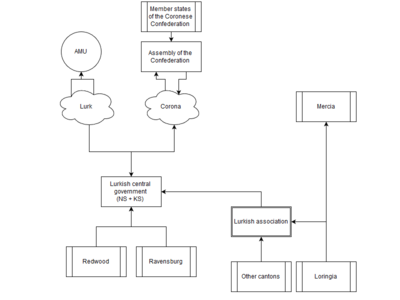
Lurk is only defined as a "democratic sovereign confederation" in the constitution, however the constitution defines the political system later on. The legislative power is executed by the National Assembly and the people through General Referendums, although cantons are free to reject confederal laws.
Structure
Confederal
National Assembly
National Assembly is composed of democratically, directly and secretively elected representatives from Lurk. The only criteria a candidate has to fulfil is to have the right to vote, which is extended to all citizens that have a full citizenship. National Assembly is composed of the Chamber of Delegates and the Council of Cantons, which can pass legislature (with simple majority) and change the constitution (with 3/5 majority) if more than one third of its members are present. The President calls the meetings of the Assembly minimally twice a year, and that is in October and March. The National Assembly can also serve as a court if the President was accused of High Treason (and the Parliament has approved it with 2/3 of its members, but 2/3 minimally must be present).
Currently, only the Council of Cantons operates, and excercises the powers of the Chamber of Delegates.
Referendums
Referendums are the element of direct democracy in Lurk. Each citizen with voting rights can start a referendum, and each is allowed to vote in it. Minimally one third of the population must vote in the referendum for it to be evaluated, and simple majority must agree with its contents for it to pass. Referendums have to be approved by the government to verify their constitutionality and their fairness (being in accordance with the rights of each citizen) to each citizen or group. If the referendum passes, the National Assembly must proclaim the law within seven days, unless the law states otherwise. If the law is rejected, a referendum or a law in the Assembly with similar or same contents can not be created for one month. Constitution is not a matter of referendums.
National and cantonal referendums have the same requirements and procedures. As all cantons are sovereign, even secession is a matter of cantonal referendums, unless it is a part of the cantonal constitution. All cantons with a constitution (majority of them, excluding Transacrestian cantons) are, by their constitution, an unseparable part of Lurk.
Ministers
Ministers, as part of the government, are appointed by the President for each term of the government. Ministeral positions are created by the President as well. Currently, there are four ministries – Ministry of Internal Affairs, Ministry of Foreign Affairs, Ministry of Industry and Finance and the Ministry of Nature.
President
President is directly, by a secret vote elected by the citizens through a two-round system, where in the first round all the candidates are allowed to take place, and in the second round only two candidates who had the most votes before participate, unless a majority is achieved in the first round. The winner becomes the new President. President can only have two consecutive terms. President, as defined in the constitution, is the head of the state, ratifies all treaties approved by the Assembly, signs new laws, declares a state of war (only with approval of the National Assembly), calls the meetings of the Assembly, has right to veto a law, creates ministeral positions and appoints ministers, can issue decrees by the decree law, is commander-in-chief, represents the nation to other nations, serves as an advisory body to the Assembly and appoints ambassadors.
Cantonal
Cantons are free to create their own constitution, the only provision is that it needs to abide by Lurkish laws and must mention the canton's membership of the Noble Republic. This lets substates of different sovereign states be part of the Noble Republic of Lurk, as well as another sovereign state. This is used mainly in Loringia (which is also a part of Mercia), to allow it to share Lurk's laws, such as road classification.
Loringia
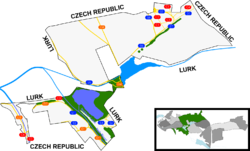
Loringia, previously a fully-integrated kraj of Lurk, joined Mercia, but stayed as a part of Lurk to continue sharing several laws and prevent the creation of more artificial borders between the various Lurkish areas. Loringia has its own Assembly, Archduke as the head of state. Loringia is considered a Mercian-Lurkish condominium by the Lurkish side.
Lurkish association
Most Lurkish cantons are members of the Lurkish association, an intercantonal organisation with the purpose to serve as a government of all the uninhabited cantons of Lurk. Currently, all the cantons within the Lurkish association are subject to the Office of the Lurkish Association, which can create its own laws and accept the federal laws within all of the cantons. Since the establishment of this organisation, the Head of the Office of the Lurkish Association is the Minister of Internal Affairs.
Ravensburg
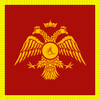
The Principality of Ravensburg, is a monarchy ruled by a Prince, Karl Friedrich von Ravensburg, thus it can be considered to be in a personal union with Loringia, except they do not share their own local laws. Ravensburg has its own constitution, which gives great power to the monarch and the Council. The Council is elected from the population of the canton and can pass laws only with the Monarchs consent. The Monarch can, on his own, create a law as well.
Redwood City
Redwood City traces its special status back to the first time it was included in Lurk, when it was claimed by the Lurk Federation and made a part of Acrest. Redwood City was, for a long time, a Directly Controlled Area by the Great Assembly of the Lurk Federation, mainly due to its remoteness from the Lurk Hills and Ravensburg. Redwood City was given autonomy at some point in late 2011 or early 2012, when it became the capital of Lurk. Currently, Redwood is a Free City and has no constitution.
Economy
The Lurkish economy is currently experiencing new activity and growth. Formerly, Lurkish economic growth proposals were based on the fact of the many electronic parts being available, clay mine in construction and many farming spots being available in Redwood City. Currently, Lurk is switching towards service economy, mostly due to the Corona intermicronational banking system. Redwood City is still being considered as the powerhouse of the Lurkish industry.
Currency
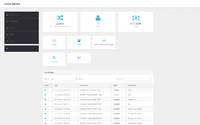
Lurk currently does not have its own currency, as it is part of the Corona monetary union in the UMSE. Corona is a digital currency with an e-banking application and a terminal application to pay via the STEMMA Card. STEMMA Card contains a QR code containing the account number. All transactions must be confirmed with a PIN-password.
Corona
Corona is an intermicronational currency used by all member-states of the Coronese confederation and a large number of Czech micronations. Corona is an electronic centralised currency with one administrative body, the UMSE Bank, controlling the emission of new Coronas. All transactions are done in the Verona transaction system between four currently existing banks.
Delta
The Delta was de facto established in the NSSR, when the Lurk Korunas were considered obsolete for a long time, and the NSSR required a currency. Alex White designed the NSSR state credit, which is, at the moment, unusable due to the socialist themes on the front side. Lurkish Delta itself had never adopted any design, even though there were numerous proposals.[3]
Companies
Many companies are registered within Lurk, all of them now experiencing major growth due to the introduction to the Corona market. The most growing fields are IT and IT services, banking and monetary services, chemical industry and agriculture. Currently, any citizen of Lurk can establish either a for-profit joint stock company, or a non-profit organisation. Whether the joint-stock company is owned by a single individual or is publically traded is irrelevant. The registration process requires the applicant to fill out a short form, and the Ministry of Economy and Industry shall process it within a few days. The state has very low control over the economy, although it reserves the right to nationalize or disband any company by the decision of the National Assembly. At the moment, the largest companies are the Lurkish National conglomerate, Aerosoft and the Lurkish Television Broadcasting Committee.
Coronese confederation
The introduction of Lurk into the Coronese Confederation brought new political and economic growth to both Lurk and other members of the Coronese confederation market. Lurk increased export of technology and services to all of the members of the Coronese confederation. Talks of future trade agreements are held informally, but commonly. Most companies in the Coronese confederation seem to operate within all of the member states, including the TK Group from Mekniss federation and the Lurkish National Conglomerate from Lurk.
Geography
Lurkish geography is rich in diversity, especially considering its small area and location in Prague. Lurk contains hills, flat fields, farmlands, rivers and streams, river meanders, islands, meadows and ponds. Lurk is very proud of its nature and geographical features, and thus they are used as the most symbolic icons of Lurk.
Lurk Hills
Lurk Hills are amongst the most important cultural symbols of Lurk and are the first claim, which has given the name to the nation. Lurk hills are home to many species of animals, mainly birds. Majority of the Lurk Hills area is protected by National Parks and Protected Natural Areas, and the Czech Republic.
Forests

Forests cover most of the sides of the Lurk Hills. Forests contain Lurk's historic site, the Bunker territory. Bunker (in Czech also used as a "club" or a ground version of a "treehouse") is a territory where a proposed base was to be located. Currently, only few sticks remain, which Lurkish historians believe to be remains of an old fence. Areas nearby were scavenged and several resources, such as old metal fence and old planks were found. This helped to choose the Lurk area for the claim of the yet-to-be established nation in the future.
Nek River
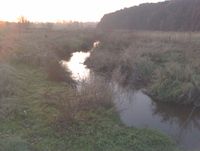
Nek River (Rokytka in Czech, however it's preferred to use Nek in Lurk) is a traditional symbol of Lurk, which has been recently reclaimed after a long period of being included in potential claims. It is the largest river in Lurk, and flows into the Nekker lake, St. Maul's Lake and ends in the Czech river Vltava. Nek River has several bridges crossing it, and the area around the Nek River is considered one of the most beautiful areas in Lurk.
Climate
Lurk shares it's borderline oceanic climate with Prague, the capital city of Czech Republic. Winters are usually cold and long, ranging from November to late March and Summers tend to be hot. Rain is quite uncommon, however some summers tend to be very rainy.
| Climate data for Prague (1961-1990) | |||||||||||||
|---|---|---|---|---|---|---|---|---|---|---|---|---|---|
| Month | Jan | Feb | Mar | Apr | May | Jun | Jul | Aug | Sep | Oct | Nov | Dec | Year |
| Record high °C (°F) | 12.1 (53.8) |
18.1 (64.6) |
24.1 (75.4) |
29.7 (85.5) |
33.0 (91.4) |
33.2 (91.8) |
36.3 (97.3) |
35.2 (95.4) |
32.6 (90.7) |
25.1 (77.2) |
19.0 (66.2) |
17.8 (64) |
36.3 (97.3) |
| Average high °C (°F) | 0.4 (32.7) |
2.7 (36.9) |
7.7 (45.9) |
13.3 (55.9) |
18.3 (64.9) |
21.4 (70.5) |
23.3 (73.9) |
23.0 (73.4) |
19.0 (66.2) |
13.1 (55.6) |
6.0 (42.8) |
2.0 (35.6) |
12.5 (54.5) |
| Daily mean °C (°F) | −2.0 (28) |
−0.6 (30.9) |
3.1 (37.6) |
7.6 (45.7) |
12.5 (54.5) |
15.6 (60.1) |
17.1 (62.8) |
16.6 (61.9) |
13.2 (55.8) |
8.3 (46.9) |
3.0 (37.4) |
-0.2 (31.6) |
7.9 (46.2) |
| Average low °C (°F) | -5.4 (22.3) |
-4.0 (24.8) |
-1.0 (30.2) |
2.6 (36.7) |
7.1 (44.8) |
10.5 (50.9) |
11.9 (53.4) |
11.7 (53.1) |
8.7 (47.7) |
4.3 (39.7) |
0.2 (32.4) |
-3.3 (26.1) |
3.6 (38.5) |
| Record low °C (°F) | −25.5 (-13.9) |
−22.5 (-8.5) |
−19.0 (-2) |
−7.1 (19.2) |
−2.4 (27.7) |
-0.6 (30.9) |
5.0 (41) |
3.4 (38.1) |
−0.5 (31.1) |
−5.5 (22.1) |
−12.4 (9.7) |
−23.4 (-10.1) |
−25.5 (−13.9) |
| Source no. 1: World Meteorological Organization[4] | |||||||||||||
| Source no. 2: NOAA[5] | |||||||||||||
Subdivisions
According to law on territorial subdivisions (03/2014 SB),[6] the Noble Republic is divided into Cantons and Oblasts, with cantons further deciding on their internal structure. Cantons choose how much they wish to be integrated with the central government, resulting in an asymmetric federation and even confederation. Cantons can create their local government.
Themes are the smallest subdivision of Lurk. They make up the lowest subdivisions. It is to be used as a part of address, for institutions or statistical purposes. The name itself is inspired from Byzantine Theme system, and the naming is inspired from modern Greek (for example, Theme Protos Alpha, Theme Deuteros Omega, etc.).
Other divisions include army okruhs, economical rajons, justice okruh and voting okruh.
Cantons
- See: Cantons of Lurk
| COA | Flag | ABBR | Code | Name | Motto | Anthem | Since | Capital | Area (m²) | Official language | Part of Lurkish Association | Self-governing |
|---|---|---|---|---|---|---|---|---|---|---|---|---|
| LR | 03 | Kanton Lurk Canton of Lurk |
Unitas omnes. | 2011 | N/A | 198 000 | Czech | YES | N/A | |||
| LK | 04 | Lurkské Krkonoše Lurkish Giant Mountains |
Cantonal anthem of the Lurkish Giant Mountains | 2013 | 48 400 | |||||||
| VT | 07 | Vertylia | 2011 | 248 000 | ||||||||
| PN | 08 | Podlurksko-Neksko Lands under the Lurk Hills by the Nek River |
2011 | 385 000 | ||||||||
| ZL | 14 | Zalurksko Translurk |
2014 | 35 900 | ||||||||
| LA | 09 | Archduchy of Loringia Lorynské arcivévodství |
2014 | 1 017 000 | Czech, Loringian, English | YES | ||||||
| SR | 10 | Sársko Saar |
2012 | 421 000 | Czech | N/A | ||||||
| EL | 12 | Elysijsko Elysia |
2014 | 114 000 | ||||||||
| ZA | 11 | Západní Akrest Western Acrest |
2012 | 336 000 | ||||||||
| JA | 13 | Jihozápadní Akrest Southwestern Acrest |
2012 | 469 000 | ||||||||
| VI | 15 | Vinice | 2013 | 482 000 | NO | NO | ||||||
| XK | 16 | Xaverský kanton Xaver |
2013 | 653 000 | ||||||||
| TA | 17 | Transakrestský kanton Transacrestia |
2013 | 484 000 | ||||||||
| RA | 02 | Knížectví ravensburkské Principality of Ravensburg |
2011 | Ravensburg | 10 | YES | ||||||
| RW | 01 | Svobodné město Redwood Free City of Redwood |
2011 | Redwood | 1500 | Czech, English | ||||||
| AZ | 18 | Lurkská antarktická zóna Lurkish Antarctic Zone |
2015 | English | NO | |||||||
| LL | 19 | Litvénsko-Lurksko Litvania-Lurk |
2016 | English | YES | |||||||
| Noble Republic of Lurk | National anthem of the Noble Republic of Lurk | 2013 | Redwood City | 4 892 810 | Czech | N/A | YES | |||||
| Loringia | 2014 | 1 017 000 | Czech, Loringian, English | |||||||||
| Department of Lurk | 2013 | Redwood City | 4 892 810 | Czech, Slin-Englysh |
Gallery
-
The Lurkish flag in the Lurk Hills area.
-
Lurkské Krkonoše
-
The "Bunker" area.
References
- ↑ Constitution of Lurk - http://public.g.lxo.cz/index.php?action=zakony&law=0
- ↑ Harry Fitzpatrick, leader of Monovia, in private conversation with Alex White.
- ↑ [Delta proposal https://twitter.com/LurkFederation/status/476083638023774208/photo/1]
- ↑ "World Weather Information Service - Prague". World Meteorological Organization. Retrieved February 28, 2013.
- ↑ "Praha Climate Normals 1961-1990". National Oceanic and Atmospheric Administration. Retrieved February 28, 2013.
- ↑ Public database of the Government of Lurk, 3rd January, 2014; L-GOV, obtained on 8 June 2014 - http://public.g.lxo.cz/index.php?action=zakony&law=8
{{#related:Mercia}} {{#related:Mercia-Lurk}}


